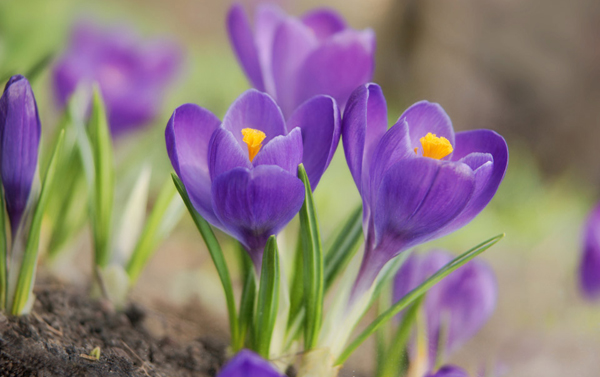Rise Up into the Day…
Like a Crocus into Spring.
On the way to school in the morning Finn and I set an intention for the day. This crocus metaphor was his. I gave him a ‘Right On!’
He followed up with asking me if I wanted to know his secret for coming up with intentions. “Absolutely!” I said. “I take whatever is in front of me, like the crocuses, and turn them into an intention.”
“Like,” and he pointed to a pile of chopped wood by the side of the road, “chop the day up into little pieces of joy. “Or,” and he pointed to the rock wall and then a basketball hoop, “rock the day like a super shooter basketball star.”
Wow, I wish I was taking on my day with this level of enthusiasm, optimism and creativity. My inner intention is always more on along the lines of… try not to be an asshole.
I was blown away.
For a long time his intentions were wonderful but a bit repetitive. I’d suggest in my most easy-going, off-handed, non-micro-managing neurotic way, that we try to make them unique to each day.
It’s not like our boys don’t know I’m crazy but I have strict rules for myself around meddling too much in the all-too-few non-task areas of our life. And, the reality is, it really does take a while to get the hang of looking at each day differently.
I’m still working on it with spotty success.
So, for Finn to have figured out, on his own, that indeed the crocuses have messages for him. As do the rock wall and wood pile. In fact, everything he comes across is there for him.
It’s there for all of us.
But, since we are each completely unique beings, what we see and what we make of what we see is totally different. A crocus coming out of the ground speaks differently to me, as a forty-eight year old working mom, than Finn.
In every single moment we encounter a palette of possibility with which we can mix up any metaphor we want and paint our day however we wish for it to be.
All that is required is paying attention.
That’s all. But ‘all’ means both so little and so much.
It is such a simple thing– to pay attention. And yet, at the same time, it is so bewilderingly complicated in our adrenalin-fed culture with our deeply embedded fears of not measuring up and falling behind.
It requires standing still as we move forward. Slowing down our heart and mind as we run full steam ahead through the very real obstacle course that is, for most of us, every day.
And to truly pay attention requires considering that what we are given is more valuable than what we want.
This, at least for me, is a heady proposition. I often resist.
Robert Frost has a poem entitled, “The Most of It”, in which a man (the speaker) calls out to life that he wants more. In fact, he wants “the most of it”. Not in our ‘western culture money, fame power’ way. He wants the marrow of life, the meat of it.
He goes into nature on a spiritual quest seeking not to feel so alienated and alone.
He asks for a response. And he gets one. But it’s not the one he wants. Not in the form he asked for it. Not a clear-cut demonstrative affirmation.
I empathize completely. I feel this way often.
Much in our life is up in the air. And I am always seeking answers. Right now, if possible. But the poem… and my life seem to be posing a question:
What if the answer we are getting (which usually appears as a wildly annoying tangent at best; seemingly insurmountable obstacle at worst) is actually simply the answer to a question we had not thought to ask?
A question we need answered more than the one we asked.
I know, this is a little convoluted, but…
What if the tangent/ obstacle is a blessing? Not in a ‘turn lemons into lemon-aide’ way. More like… the universe just poured you a chilled glass of Taittinger Brut Francaise bubbly.
Frost poses this question a bit differently but underscores this same irony.
The Most of It
“He thought he kept the universe alone;
For all the voice in answer he could wake
Was but the mocking echo of his own
From some tree-hidden cliff across the lake.
Some morning from the boulder-broken beach
He would cry out on life, that what it wants
Is not its own love back in copy speech,
But counter-love, original response.
And nothing ever came of what he cried
Unless it was the embodiment that crashed
In the cliff’s talus on the other side,
And then in the far-distant water splashed,
But after a time allowed for it to swim,
Instead of proving human when it neared
And someone else additional to him,
As a great buck it powerfully appeared,
Pushing the crumpled water up ahead,
And landed pouring like a waterfall,
And stumbled through the rocks with horny tread,
And forced the underbrush–and that was all.”
Perhaps “–and that was all” was everything. Not nothing.
And maybe “the most of it” is more fantastical than we imagine.
I asked Finn if he wanted to hear my secret for coming up with new intentions. He said yes. “Well,” I said, “kind of the same as you, except for me, I borrow from some part of what we read together each morning.”
“So if it had been my turn, I might have said, similar to the fact ostriches, in fact, don’t bury their heads in the sand– that we try to find the truth behind things that don’t seem to make sense.”
He smiled. I told him it was a good thing it was his turn since his crocus kicked my ostrich’s butt!
And I’d WAY rather rise up into the day like a crocus into spring!
But my true intention, which I did not say, had nothing to do with what we read.
There was a powerful metaphor in how he read that connected back to this idea of noticing what IS there rather than what we want to be there or how we can fix what isn’t there.
Finn sometimes uses umm a lot. But this morning I noticed that his umms had nothing to do with stalling to figure out hard words ahead. And it didn’t seem like a nervous tick because he is not a very nervous child by nature.
It dawned on me that his umms were more like sandboxes in the thicket of adult expectation. A space for his mind to play and explore with the images, thoughts and fantasies that were inspired by the text. A way of circumnavigating what he knew those trying to help him found distracting.
A pause for freedom.
So, I asked him if we could do an experiment wherein he didn’t say umm at all for one paragraph. He did it perfectly.
But, he broke up the paragraph with What if’s? and How come’s? and Why not’s? With questions and commentary, analogues and associations– with intrinsic curiosity and engagement.
And isn’t that the point? For all of us?
To be curious. To notice what IS there. To pay attention.





